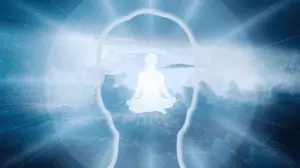Last Updated on September 5, 2024
True, anxiety and panic attacks are crippling. They cause you to feel a whiplash of negative emotions like fear, paranoia, and panic.
But did you know it’s not just there to give you problems? Did you know it’s your spirit’s way of reaching out to you?
In this article, we’ll discuss the spiritual meaning behind anxiety — and everything you must know about it. Our goal is to get to the bottom of your anxieties, and why you feel the way you feel.
What does having anxiety disorders mean spiritually?
Having an anxiety disorder can be problematic — and a person’s spirit is telling them that. Their spirit is telling them something isn’t right, and they need to correct it.
Think of it this way. The role of the spirit is a man who sounds a horn to give a person a warning signal. And the loudness of the horn’s sound depends on the type or level of anxiety that person is suffering from.
Those who have experienced panic attacks can relate to the intense fear and discomfort described in biblical terms, encouraging a spiritual approach to managing such anxiety through faith and prayer.
Usually, the problem is with a person’s mental health. If they’re not in the best shape mentally, their spirit is struggling. Their spirit feels trapped and it wants to get out.
What are the three types of anxieties and how are they relevant to a person’s spirituality?

The three types of anxiety are:
Generalized Anxiety Disorder (GAD): This type of anxiety is characterized by chronic and excessive worry about various aspects of life, such as work, health, or finances. It can significantly impact a person’s spiritual well-being by causing them to lose faith or feel disconnected from their spiritual practices.
Panic Disorder: Panic disorder involves sudden and intense episodes of fear, often accompanied by physical symptoms like heart palpitations, shortness of breath, and dizziness. These panic attacks can make individuals feel out of control and spiritually lost, as they struggle to find peace and stability.
Social Anxiety Disorder: Social anxiety disorder is the fear of social situations where one might be judged, embarrassed, or scrutinized by others. This can lead to isolation and a sense of spiritual emptiness, as individuals avoid social interactions that could otherwise provide a sense of community and support.
Addressing these anxieties requires a holistic approach that considers physical, mental, and spiritual aspects. By doing so, individuals can find freedom from their anxieties and achieve true healing.
Neurotic anxiety
This describes an unconscious worry of losing control. If a person has it, it causes them to overthink. They can overthink all sorts of situations — including improbable situations.
People with neurotic anxiety are sometimes labeled as crazy, delusional, and mentally challenged. That’s because their thoughts are behind their crazy, delusional, and mentally challenged behavior.
With therapy, especially cognitive behavioral therapy, though, their perspective can be adjusted. And they’ll return to a normal state of mind.
However, many also experience a ‘dark night’ of the soul, where emotional and spiritual turmoil deeply affects their nighttime rest and daytime thoughts.
Moral anxiety
This type of anxiety is like a person’s fear of going against their better judgment. Usually, people with it want to do tasks other than the ones they’re doing at the moment.
Because it addresses morality, it can overlap with the symptoms of sacred anxiety. And some people think of the two forms of anxiety as the same.
Moral anxiety, however, is different from sacred anxiety. The former discusses the subject of morality in a broad sense. Meanwhile, sacred anxiety is focused on the dread of existentialism.
Faith in Christ Jesus can be a source of comfort and guidance in managing moral anxiety.
Reality anxiety
This refers to anxiety based on real situations. These events include almost every possible negative thing that can happen like a natural phenomenon, dog bites, and terminal illnesses.
All of these types of anxieties affect a person’s spirituality. And spiritually, the most alarming type is neurotic anxiety. It can put them in danger because it’s uncontrollable. Recognizing the body’s signals during body panic attacks can help manage the intensity and frequency of these experiences.
Are anxiety attacks different from panic attacks?
Yes — anxiety and panic are different from each other. What makes people think they are one and the same is, they’re both mental health problems. Plus, their symptoms are similar.
Their symptoms include overwhelming fear, sweating, trembling, chest pain, and more. Sometimes, people who are having attacks vomit and have headaches.
What makes anxiety and panic different?
The difference between anxiety and panic is, anxiety attacks usually happen because of a phobic disorder, PTSD (Post-Traumatic Stress Disorder), or other anxiety disorders. They also last for months and if left untreated, won’t go away and have a high tendency of exacerbating.
Meanwhile, a person experiences a panic attack because they misinterpret the physical symptoms of an anxiety attack. This can escalate into full blown panic attacks, which are intense and last (relatively) briefly — for about 10 minutes.
Can anxiety attacks and panic attacks happen for no reason?

In most cases, anxiety attacks and panic attacks don’t happen without a reason. A person experiences them because of too many emotions — especially emotions they can’t understand, which can sometimes feel as intense as a heart attack.
But there are cases. Attacks can happen out of the blue. It can happen when a person is busy, relaxing, or at any time of the day, too.
And if this is the case, it’s more inclined to a person’s . It’s a sign the spirit is desperate to communicate with the physical body. Because it couldn’t find another method of communication, it triggers this kind of attack.
Is there a type of anxiety linked to attacks that happen for no reason?
Out-of-the-blue attacks are also usually linked to a specific kind of anxiety, reality anxiety. As discussed earlier, reality-based anxiety is anxiety related to a person’s fear of real-life events, often manifesting in physical symptoms like heart palpitations.
What links this to out-of-the-blue attacks or what makes it stand out from other types of anxieties is, it can seem like a normal response.
Is it normal to experience random attacks with chest pain?
A person suffering from this type of anxiety may have a tendency to be unaware they have a problematic response. They also may be unaware they’re having an attack or that they’re suffering from anxiety, at all, often triggering the body’s flight mode.
If this is what’s happening, it’s advisable the person dials down on their lifestyle. They can take breaks, go to spas, and get enough sleep.
While this type of anxiety is terrible, a salvageable aspect is that it’s less challenging to treat. If a reality anxiety attack happens, a person can be rid of it permanently. That is if they cooperate with their treatment partners and make lifestyle changes.
What causes anxiety and why is it important to know them?
There are many factors that cause anxiety. The most common ones are stress, trauma, and fear. The less common ones are medical illnesses and genetics.
It’s important for a person to know about the specific cause of their anxiety. Only then can they understand the cause of what’s making them ill. And once they can understand the causes, that’s when they can properly treat their illnesses.
Can an anxiety disorder be used as energy?
The silver lining: A person can use their anxiety to move up in life!
Anxiety can direct a person to whatever needs their attention. It can help them be attentive in the present moment and at the same time, cultivate awareness.
For example, if someone is anxious about their birthday party, it’s a sign they want things to go well on the day. Rather than allow their anxiety to get the better of them, they can take an alternative approach. What they should do instead is to check if things are organized according to plan.
Here are more ways a person can use anxiety to your advantage:
Find balance – If the cause of anxiety is stress, a person can take some time off. Then they can use that time to ponder, rest, practice deep breathing, socialize — or take their much-needed break however they want
Identify core values – If the cause of anxiety is fear, a person can reflect on their life. And as they reflect, they can identify their core values and the understand life’s value
Discover full potential – If the cause of anxiety is the fear of failure, a person can motivate themselves to always achieve greatness. They can use it to find more inspiration or as fuel to accomplish new heights and push themselves to be their best versions.
In times of anxiety, turning to faith in Jesus Christ can provide comfort and guidance.
Final thoughts
There’s no denying that experiencing anxiety can be a nightmare. Don’t ignore it, though. If you leave it untreated or respond to it incorrectly, it can worsen.
In addition to getting professional and medical help with your mental health, do your best to also look at matters from a spiritual perspective. As the discussions above go, your spirit is trying to tell you something.
Listen to its message. It’s reaching out to you to help you.



